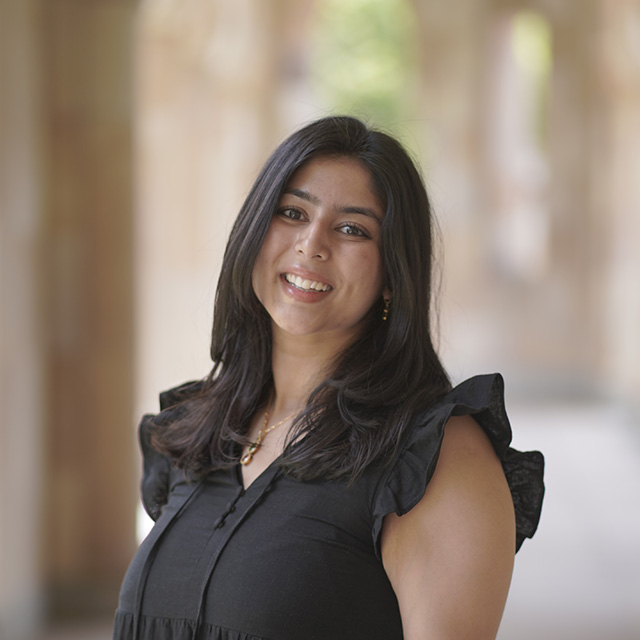Yastika Banerjee: From virology to science commercialisation
For Yastika Banerjee, a third-year PhD candidate at The University of Queensland’s RNA Virology Lab, biotechnology goes beyond research — it’s about pushing boundaries, forging connections, and making a real-world impact through science. Originally from India, Yastika relocated to Australia at 18 to pursue her studies, navigating challenges and adapting to a new culture along the way.
Her research focuses on predicting the evolution of SARS-CoV-2, with the potential to develop a universal COVID vaccine to reduce the risk of vaccine-resistant variants. “This project was established because of the COVID-19 pandemic, and I feel extremely privileged to be part of this research under the supervision of Professor Alexander Khromykh.”
But beyond the technical work, she takes pride in how she has tackled personal challenges. “Moving to a different country and adapting to an unfamiliar system was difficult, but navigating those obstacles and building a strong support system is one of my greatest achievements.”
Her journey was shaped by the encouragement of UQ’s biotech faculty, particularly by Professor Avril Robertson, Dr Lisette Pregelj and Professor David Ascher. “They were incredibly supportive of my dreams and aspirations, and I still go to them for advice today.”
Impact beyond science
While Yastika’s research has the potential to shape future vaccines and therapeutics, she envisions a broader legacy.
“Yes, I want my work to contribute to pandemic preparedness, but I also strive to break gender stereotypes, make science more accessible, and help bridge the gap between research and commercialisation.”
Science communication has become a true passion for her, especially in simplifying scientific findings for the public. “The pandemic highlighted just how crucial clear communication is — even something as simple as showing how to wear an N-95 mask properly can make a huge difference.” To develop this skill, she got involved in tutoring at UQ and led practical demonstrations for a third-year virology course coordinated by her supervisor, Professor Alexander Khromykh. Her efforts to make complex concepts more understandable earned her the Best Tutor Award, a recognition she values deeply.
Her internship at PersistAI in San Francisco, as part of the Startup AdVenture organised by UQVentures, introduced her to the dynamic world of biotech startups, which she finds particularly exciting. “Well-established biotech and pharmaceutical companies are doing incredible work, but startups are fascinating because they begin from scratch and grow into something truly impactful, the entire commercialisation pipeline is very intriguing to me.”
The future of biotech: RNA tech and AI
Looking ahead, Yastika anticipates that cutting-edge RNA technologies and artificial intelligence will play a critical role in predicting viral mutations and shaping vaccine design.
“AI-driven approaches are already transforming medicine, and in the next 15 years, they will revolutionize how we prepare for pandemics.”
She is also passionate about making science more inclusive. “Women in STEM often face outdated stereotypes. I want to be part of the team that challenges those challenges those preconceived notions.”
Memories of UQ and the biotech community
UQ has played a defining role in Yastika’s journey. “The biotech cohort is like a family. Regardless of the mistakes you make, they support you and ensure you leave with new knowledge and insights.”
Some of her favourite memories include pulling all-nighters with friends before exams. “We’d try to cram 13 weeks of content into 2 nights – not the best study method, and I would never recommend it, but it was fun!” she laughs.
Academically, there were moments when she felt like giving up. “However, I persevered, got first-class honours under the supervision of Dr Karl Robinson at QAAFI, and started my PhD. Looking back, those moments of resilience are what I’m most proud of.”
She also credits UQ’s biotech faculty for making her feel welcome from the start. “During my first year, we had a weekend camp on Stradbroke Island. The program director, Professor Avril Robertson, asked me what I wanted to be when I grew up. I told her I wanted to be a stand-up comedian. She didn’t even flinch – just said, ‘I can totally see that!’ That kind of encouragement meant a lot.”
I also had the privilege to be introduced to The Hon. Ros Bates MP, Queensland Minister for Finance, Trade, Employment and Training, by Professor David Ascher, where I had the opportunity to discuss why I chose to pursue biotech at UQ for my higher education as well as to discuss my future plans.
Advice for future biotech students
For students considering a future in biotech, Yastika’s advice is simple: talk to people. “You will make mistakes, and at times, you may make decisions that seem questionable. However, without initiating conversations, you won’t receive the support you need.”
She encourages students to be curious and proactive. “Ask many questions, not necessarily about science. If you have a big dream – whether it’s winning a Nobel Prize or starting a biotech company – talk to people about it. Put your dreams out into the world.”
The importance of mentorship and connection
One of the things that drew Yastika to UQ was the close relationship between faculty and students. “I attended an international webinar before Open Day, where prospective students could ask course coordinators questions directly. That level of access played a significant role in my decision. Later, during my degree, I serendipitously had the opportunity to become a panellist in the same webinar – a truly full-circle moment.”
She hopes UQ continues to foster that environment. “The biotech faculty cares about students. They don’t just teach, they mentor.”
And as for that dream of stand-up comedy? “I still want to do it when I’m 60,” she says with a grin. “But for now, I’m focused on learning, staying curious, and doing my part to make science more accessible to those who may not fully understand it.”


 Read more inspiring stories from UQ biotechnology alumni
Read more inspiring stories from UQ biotechnology alumni